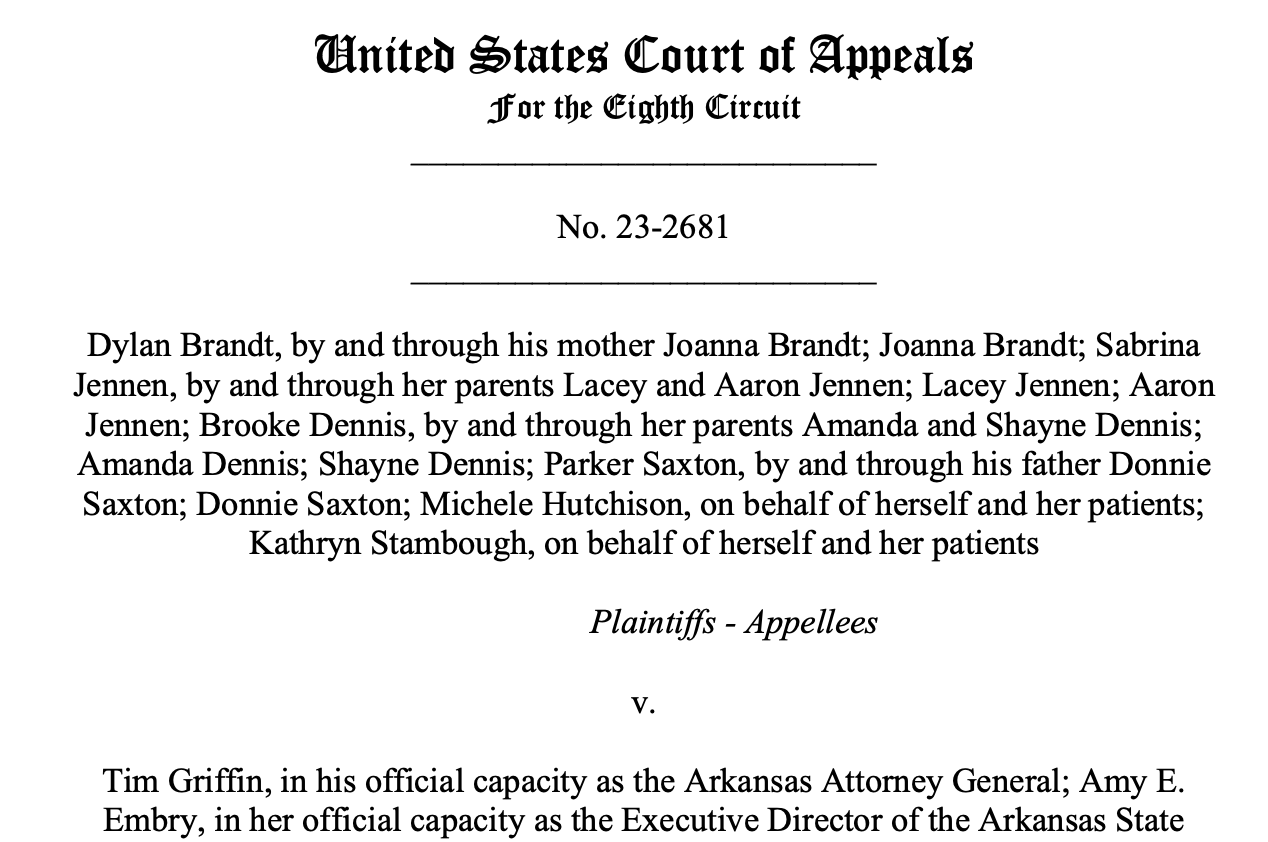Appeals court reverses course, upholding Arkansas's ban on trans medical care for minors
The law has been on hold since 2021, but, after June's Supreme Court ruling addressing a similar Tennessee law, the Eighth Circuit upheld Arkansas's law.
A full federal appeals court on Tuesday upheld Arkansas's ban on gender-affirming medical care for minors.
The first such law — passed by the legislature there in 2021 over the veto of the Republican governor — its enforcement had been enjoined since a preliminary injunction in the case had been issued four years ago.
In the wake of the U.S. Supreme Court's June decision in United States v. Skrmetti upholding Tennessee’s similar law, however, the U.S. Court of Appeals for the Eighth Circuit issued an 8-2 decision on Tuesday that tracks the high court’s opinion, reverses the trial court decision striking down Arkansas’s law, and tosses out earlier circuit court precedent that upheld the preliminary injunction.
Tuesday’s decision also goes further than Skrmetti, rejecting the plaintiffs' parental rights claim — the issue not decided by the Supreme Court in Skrmetti — and a First Amendment claim brought by medical providers.
This is the world that Chief Justice John Roberts virtually guaranteed would be forthcoming with his circular-reasoning opinion in Skrmetti.
In dissent, Judge Jane Kelly — the sole Democratic appointee on the appeals court — called out the ways in which the appeals court ignored the extensive record developed at trial in the case.
“In my view, this record implies that the Act reflects ‘mere negative attitudes,’ or ‘unsubstantiated’ ‘fear’—namely, a moral panic about gender dysphoria in adolescents,” she wrote.
Across the Eighth Circuit — which includes Iowa, Minnesota, Missouri, Nebraska, North Dakota, and South Dakota, in addition to Arkansas — that “moral panic” is now the law.
Applying Roberts’s reasoning from Skrmetti, Judge Duane Benton — a George W. Bush appointee like the chief justice — easily dispatched the equal protection arguments brought by the Arkansas plaintiffs in their challenge to the 2021 law.
“The undisputed facts found by the district court demonstrate that there is a ‘reasonably conceivable state of facts that could provide a rational basis for the classification’ in the Act,” Benton wrote, quoting Skrmetti. “Because a conceivable state of facts supports the Act, this court will not ‘second-guess the lines’ that the Act draws between gender transition procedures and other medical procedures.”
Kelly, joined by Judge James Loken, wrote in dissent that she would have sent the case back to the district court to decide whether Arkansas’s law passed rational basis review in light of the trial court’s findings in the case — something not present in the Tennessee case.
“Unlike Skrmetti, which took the State’s justifications for its act at face value, this case involves factual findings from a lengthy trial,” Kelly wrote. “And those findings—none of which the State disputes on appeal—reveal a startling lack of evidence connecting Arkansas’ ban on gender-affirming care with its purported goal of protecting children.”
Kelly was nominated to the court by then-president Barack Obama in 2013. Loken is the oldest active judge on the court, a George H.W. Bush appointee who has served on the court since 1990.
“Startling” or not, with Roberts’s Skrmetti opinion backing them, the eight judges of the Eighth Circuit in the majority — all George W. Bush or Trump appointees — didn’t need evidence.
Dropped in a footnote, Benton went so far as to say that it did not even matter if lawmakers were motivated by “negative attitudes against transgender people.“ Instead, he wrote, “Because the Act ‘is not the product solely of animus,’ it does not ‘fall within the … ambit’” of Supreme Court precedent striking down a law under rational basis because it was held to be based on animus.
As to the parental rights claim — a “substantive due process” argument — Benton wrote that the Eighth Circuit decided such a claim was also subject to the same rational basis review that the Supreme Court held applied to the plaintiffs’ equal protection claim in such challenges.
Applying the Supreme Court’s “history and tradition” test that has been used to limit court rulings in favor of new “substantive due process” rights, the Eighth Circuit rejected the argument.
“Given the two parallel currents in this Nation’s history and tradition—first, states can prohibit medical treatments for adults and children, and second, parents cannot automatically exempt their children from regulations—this court does not find a deeply rooted right of parents to exempt their children from regulations reasonably prohibiting gender transition procedures,“ Benton wrote for the court.
This was, I noted on July 1, the very message the Supreme Court sent to lower courts when it came to varying views on parental rights before leaving for summer recess.
Kelly, again joined by Loken, would have remanded this question to the district court as well.
Finally, the Eighth Circuit was unanimous in its ruling against the plaintiffs in a First Amendment claim arguing that the law’s ban on “referring” minors for gender-affirming medical care procedures was unconstitutional.
The referral provision, the court held, “means a formal ‘referral for’ treatment, not merely informing patients about the availability of procedures.”
In her opinion dissenting on the equal protection and due process rulings, Kelly (and Loken) joined that portion of the ruling due to the “narrow” nature of the decision.






Goodbye reasonableness and medical science … hello eugenics.
All science has been declared as fraudulent and only misinformation can be considered truthful. Welcome to Wonderland!